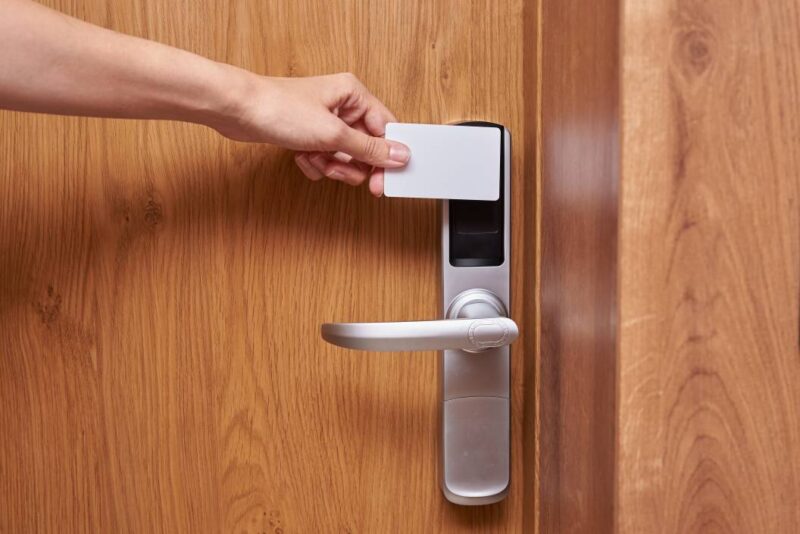As the hotel industry continues to evolve, the significance of access technology in providing a seamless guest experience cannot be overstated. The evolution of hotel key access has seen a remarkable shift from traditional lock-and-key systems to more sophisticated and convenient hotel key cards.
This article aims to delve into the various aspects of hotel key card access, from its technology and advantages to the impact of design on the modern guest experience. Furthermore, it explores alternative access technologies, sustainability considerations, and future trends, ultimately providing insights into choosing the right hotel key card system.
Evolution Of Hotel Key Access
The evolution of hotel key access has been a testament to the industry’s commitment to enhancing guest convenience and security. Gone are the days of physical keys and cumbersome lock mechanisms.
The advent of hotel key cards revolutionized the way guests access their rooms, offering a more efficient and secure method. It’s fascinating to trace the evolution of hotel key access from its early iterations to the sophisticated systems in use today.
“One of the primary reasons hotels started using key cards is the enhanced convenience they offer to guests. With key cards, guests no longer have to worry about losing or misplacing their keys. They can easily carry the small, lightweight key cards in their wallets or pockets, which is much more convenient than carrying bulky metal keys.”
- What Year Did Hotels Start Using Key Cards? A History by Hotel Chantelle
In the past, physical keys posed various challenges, such as the risk of misplacement or unauthorized duplication. This prompted the need for a more secure and manageable solution, leading to the introduction of key cards with magnetic strips.
These early key cards utilized magnetic technology, allowing a guest to access their hotel room by performing a swiping motion in front of a card reader. While revolutionary at the time, these systems had their limitations, including susceptibility to demagnetization and wear and tear.
The next significant leap in hotel key access technology came with the introduction of radio frequency identification (RFID) key cards. RFID technology offered enhanced security and convenience, allowing guests to simply wave their key cards in front of a reader to gain access.
This evolution significantly streamlined the check-in process and improved overall guest satisfaction. The evolution of hotel key access demonstrates the industry’s relentless pursuit of providing a seamless and secure guest experience.

The Technology Behind Hotel Key Cards
The technology behind hotel key cards is a fascinating blend of sophisticated engineering and practical design. At the heart of these key cards lies the encryption technology that ensures the security of guest rooms. Encryption is pivotal in safeguarding against unauthorized access, making it a fundamental aspect of modern hotel key card systems.
Radio frequencies in RFID hotel key cards enable seamless communication between the card and the door lock, facilitating quick and secure access. Unlike traditional magnetic stripe cards, RFID key cards do not require physical contact with the reader, reducing wear and tear and enhancing durability.
Similarly, NFC key cards contain embedded microchips that securely store access credentials or room details. When a guest holds the card near a compatible door lock, the reader communicates with the embedded chip to authenticate the information, allowing access if verified.
The security of both RFID and NFC cards can be improved by utilizing the internet and cloud technology for access control management. Access credentials and permissions are centralized and stored in a cloud system accessible remotely. Hotel staff can easily grant or revoke access, track usage, and customize permissions from anywhere with an internet connection.
These technologies have redefined the guest experience, providing hassle-free access to hotel rooms. RFID and NFC solutions, combined with a cloud system, offer more security. The integration of advanced technologies and design elements underscores the commitment of the hospitality industry to providing a sophisticated and memorable guest experience.
Advantages Of Hotel Key Cards
The adoption of hotel key cards brings forth a myriad of advantages, both for you and your guests. From a guest’s perspective, the convenience and ease of use of key cards significantly enhance the overall experience. Guests no longer need to carry bulky keychains or worry about losing their keys, as a single key card grants them access to their room and other designated areas within the hotel.
For hotel operators, the advantages of key card systems extend beyond guest satisfaction. The ability to track and monitor key card usage provides valuable insights into guest behavior and preferences. Additionally, key card systems offer the flexibility to reprogram cards, enabling quick deactivation in the event of loss or checkout.
This level of control enhances security and operational efficiency, making hotel key cards a compelling investment for modern hoteliers. Furthermore, the cost of producing hotel key cards can be kept to a minimum through the use of recycled PVC.
The seamless integration of key card systems with other hotel technologies, such as energy management and room access control, further amplifies their advantages. By utilizing a single key card for multiple purposes, hotels can streamline their operations and reduce the environmental impact of traditional key-based lock systems.
Disadvantages Of Hotel Key Cards
Hotel key cards have been a staple in the hospitality industry for years, but they do come with some drawbacks:
- Prone to Demagnetization or Damage: Hotel key cards can easily get demagnetized, making them unusable. They can also be damaged by exposure to magnets, electronics, or water, causing inconvenience for guests who then need replacements.
- Risk of Misplacement or Loss: Small and easily misplaced, key cards are often lost by guests. This creates security risks, especially if they are found by unauthorized individuals who can potentially access guest rooms.
- Limited Functionality: Traditional key cards only serve as room keys. They lack the ability to offer additional features or personalized services to guests beyond room access.
- Environmental Impact: Key cards are typically made of plastic, contributing to environmental waste when they’re discarded. While efforts are made to recycle them, they still add to the hotel’s environmental footprint.
Aside from the drawbacks of using hotel key cards, there is a growing need for hotels to transition to mobile key technology and it is becoming increasingly evident in today’s hospitality landscape. This shift isn’t just about embracing the latest trends; it’s a strategic move that aligns with evolving guest preferences and technological advancements.

Mobile Keys – The Future In Hotel Key Access
The future of hotel key access is poised for further innovation and integration with advanced technologies. The convergence of access control systems with artificial intelligence and machine learning holds the potential to enhance security protocols and personalize the guest experience.
Modern travelers seek seamless and personalized experiences, and mobile key technology offers precisely that. It enhances security through robust encryption and remote deactivation features, addressing concerns about key card vulnerability. Moreover, the convenience and accessibility of using smartphones as room keys streamline check-ins, reduce the risk of lost keys, and empower guests with added control over their stay. Additionally, the environmental benefits of reducing plastic waste align with growing sustainability expectations.
Embracing mobile key technology isn’t just a convenience upgrade; it’s a fundamental shift that allows hotels to cater to the expectations of a tech-savvy audience while improving operational efficiency and environmental responsibility.
The integration of IoT locks in the hospitality industry presents a promising future in hotel key access. IoT locks, such as those from 4Suites, offer a seamless and secure method for guests to access their rooms. These smart locks can be operated through mobile devices, allowing for keyless entry and enhancing convenience for guests.
Moreover, the emphasis on data privacy and security will drive the development of encryption technologies, ensuring that hotel key access systems remain resilient against evolving cyber threats. As many clients expect a seamless and personalized experience, the future of hotel key access will be characterized by a harmonious blend of convenience, security, and sustainability.

Mobile Hotel Key Solutions From 4SUITES
The evolution of hotel key access from traditional lock-and-key systems to RFID technology has reshaped the way guests interact with hotel spaces. But mobile keys are now on the rise as more hotels are using the technology, setting new standards for seamless and secure access.
At 4SUITES, we offer a unique and 100% cloud-based IoT solution for contactless entry via mobile keys that require no additional app downloads. Our digital keys eliminate the risk of losing on-card data and real-time guest access, all while providing management insights for the hotel staff through a cloud-connected platform.
Do away with hotel key cards and give your guests the technology they deserve with our intuitive, flexible, and seamless access solutions. Explore our resources to better understand mobile keys and book your demo today for an interactive session on how we transform your hotel experience.


